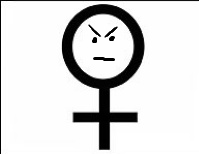The latest thing which we’re meant to discuss if it is or isn’t feminist is selfies: those little pictures we take of ourselves. Most of us fell somewhere between “Yes, I’m a feminist and I take selfies” and “Meh”, but in the spirit of media-friendly debate and clickbait, some awful stuff had to be shat out and published.
Jezebel stepped up for publishing the worst. I can’t say I’m surprised, since they’ve managed to be godawful in the past on other issues, most notably with their massive race problem, which interacted with them defending and enabling an abuse perpetrator. This article isn’t as bad as those things, but it’s still so awful I won’t link to it. It’s called “Selfies Aren’t Empowering. They’re a Cry for Help.” For reals. And its argument falls into two strands: “women aren’t saying anything in pictures of themselves” (?!) and “it’s just a way of getting validation from other people” (????!!!!!)
Here’s a picture of my face while I was reading it:
You might not think it, since I decided to stick a big picture of my horrorshock face in the middle of this post, but I’m terrified of having my photo taken. When it comes up, I am filled with bubbling anxiety and almost end up on the brink of tears. I don’t have any current photo ID because I hate the idea so much, and I have often ended up disappearing when among friends and the camera comes out.
It started some years ago. I won’t go into detail, but suffice to say it involved a man, coercion, a camera and my naked body. Since then, I haven’t exactly had the association of cameras with male control of me broken. I often encounter cameras in my interactions with the police: they photograph and film me and people like me to keep us in line. It’s a threat, the way police hold the cameras: we are watching you, and we will attack you and say you deserved it all along. This method of using cameras has since filtered down to the kind of misogynist who likes to do the cops’ work for them, and will photograph and film those who call them out on their behaviour in an attempt to intimidate.
To me, someone taking my photo is therefore intrinsically linked with patriarchal control. Whether it’s sexual or behavioural control, it is an attempt to mould me into something that men want me to be: the quiet woman, the sexual object. They use the camera to position me into whichever roles they would prefer me to occupy.
It’s different with selfies. With selfies, I have complete control over my own image.
I suppose I started taking selfies when I realised there were some things that words couldn’t articulate well, and what I needed to say was best said with my face and body. When putting a webcam or a front-facing camera in front of me, I can see exactly what I look like, and make sure, before taking the snap that I look how I want to look and I am communicating what I want to communicate.
And that’s why I take selfies. Because it’s me presenting myself to the world in the way I want to be presented.
I am not filtered through a male lens into what these shutterbug Pygmalions want to see. It’s just me and my message.


Selfies aren’t inherently feminist or antifeminist. They just are. You can use them in a feminist way, or in an antifeminist way. Just like any other means of expression.
FFS, this is like a few years back when they were arguing that women expressing their opinions through “mommy blogging” was reactionary and antifeminist because how dare women express themselves about stuff guys tend not to write about? Selfies aren’t what’s antifeminist, here. Wanting to limit womens’ expression to what other people view as acceptable things to express, on the other hand, is about as antifeminist as you can get.
OH GODS YES. So much to all of this.
Bottom line, it’s about who controls the image, who holds the camera. Cameras can be tools against oppression as much as for the oppressors – witness the many, many phone cameras used in protests these days.
As a feminist and an amateur photographer I think a lot of it is to do with not wanting women (I’m not one, but I “used to be” one) behind a camera controlling an image. The photography world is very, very male-dominated, and when a woman dares to create images of herself as she wishes to be portrayed, people (read: men) can’t handle that. A photograph of a woman, in their eyes, should be portraying a certain image, one which places the woman as subordinate to the camera. When women own the camera, when a woman is the camera’s master, that is turning on its head this idea of subordination to the camera; instead she becomes the dominant party and that is extremely unpalatable to patriarchal society.
I thought I was the only one with a camera aversion.
I read years ago about an indigenous American community that believed that taking a picture was stealing a part of someone’s soul, and that idea resonated – in that its you, but you frozen in time, an instant of you in image form, and there’s something about that thats kindof creepy to me.
But selfies to me dont seem any better, if anything you are more intimate with your self than you are with other people so its likely to be revealing a more intimate moment, rather than one which has already been processed for the physical viewer holding the camera.
There is also the issue that in photographs, I am short, fat and ugly when in reality I am tall, slim and beautiful. I prefer reality to photographs.